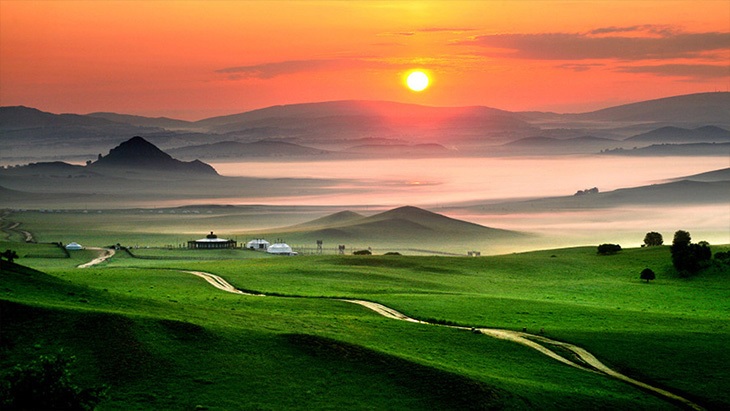.
Toward Yehuling, 1211
Unfolding steppes emerge as flattened plains
Of long grasses of gold and April-green,
While crystal streams, like bold and careless children,
Careen away through boundless fallow fields.
Horses graze nearby on budding sprouts
While courtly falcon streaks the sky alone,
Now mantled in the palest morning sun—
As all of under-heaven slowly thaws.
The squatting yurts that stud the overcast
Horizon offer up their steles of smoke.
The men astride their horses test the air,
Descrying signs in wind and warming soil.
For soon it will be time.
Soon hooves will faintly stir
From sleep a bounded land
And whisper words of war.
Across the plains, beyond the sleep-eyed herd,
A snaking wall of stone, a coiled shield:
A hoary dragon sinews mountain paths
With flame enough for countless men and steeds.
But here the pasture plains are yet untrammeled;
Here the runnels course like wayward foals.
Here fires only warm, and bowmen hunt,
And here still flows the milk of paradise.
.
Poet’s Note: The battle at Yehuling (literally “Wild Fox Ridge”) was the first major struggle between the Jin Dynasty and the increasingly-powerful Mongol Empire. The march toward Yehuling began in the early spring of 1211, with the majority of the fighting occurring between August and October of that same year. This part of the campaign was a total victory for the Mongols, allowing them to gain a foothold in the northern Jin territories and initiating a downfall that would culminate 23 years later in the collapse of the Jin Dynasty.
.
.
Talbot Hook is a PhD student and occasional writer currently living in Connecticut.




Yet soon to be a paradise lost!
A very visual poem that feels timeless.
Thanks for the read, Talbot.
Much appreciated, Paul. I find this area of Asia very enthralling, so I’m glad to be able to capture it.
The images and descriptions are rich & abundant, creating a panorama I can see clearly in my mind’s eye. End rhymes were unnecessary; the poem as written is sonically coherent, and the mind’s ear hears chiming throughout. The metrical substitutions (where they occur) are deftly measured and managed. It was altogether a very engaging ride.
Thanks, C.B. I won’t lie: some of those lines took a great deal of tweaking, so I’m glad the end result came out well.
Very nice, Talbot. Love the imagery, the feeling of being there.
Appreciated, Paul. Thanks for writing in.
The trimeter stanza is so chilling there, the quickened beat.
I was a bit hesitant to include it, as it breaks the blank verse, but it felt appropriate to me, and I’m therefore glad it didn’t end up badly! Thanks, Monika.
Beautifully descriptive and musical.
Thanks, Cynthia. I’m glad I could conjure up what I had in my mind’s eye/ear!
Talbot, I love the rich, mellifluous language and exquisite imagery. A beautiful poem.
Many thanks, Susan. And what a lovely image to accompany it!
As one who is familiar with the Mongol territory and Russian steppes, this is a beautiful depiction of familiar scenes to me. Thank you for revealing the date and opposing forces, or else I would have guessed Russian Cossacks riding and fighting, So well done, I felt as if I were there.
Glad to hear it, Roy, and thanks for writing in. Have a lovely day/night!
This seems to be a poem exploring the origin of war and conquest. Whence come the men and the energy to create an empire? Spring fever? Horses, or the relationship of man, horse, and bow? The milk of paradise nourishing the will to expand it? The freedom to move and the exhilaration of motion? A mysterious impulse exemplified by the short-line stanza within the blank verse? Your poem, Talbot, appears to say it is not just one of the usual answers like strong leaders or population pressure.
I would like a little authorial explication of the last two lines of stanza 5. That stanza, apparently referring to the Great Wall, seems to picture China rather than Mongolia. Don’t quite understand the declaration about dragon, mountains, men, and steeds.
Hi, Margaret,
Origins indeed, and a fairly humble one for this people of the steppes! As to stanza 5:
Across the plains, beyond the sleep-eyed herd,
A snaking wall of stone, a coiled shield:
A hoary dragon sinews mountain paths
With flame enough for countless men and steeds.
You are indeed correct that it refers to China, as this poem attempts to portray the marshalling of Genghis Khan’s forces to the north of Jin China. The Mongols were headed this way in March of 1211, and their scouts’ job was to identify a less-defended area in the Jin defenses. They decided upon the land protected by Wusha fortress which led to Yehuling, and from there to Juyong pass and the Jin capital at Zhongdu. The dragon which sinews those mountains is the Great Wall (though it wasn’t continuous), and the “flame enough for men and steeds” is the metaphoric dragon’s flame of watchmen and soldiers which would fold upon and destroy any would-be invaders. I hope that helps clarify things a bit.
Thanks for your comment, as always!